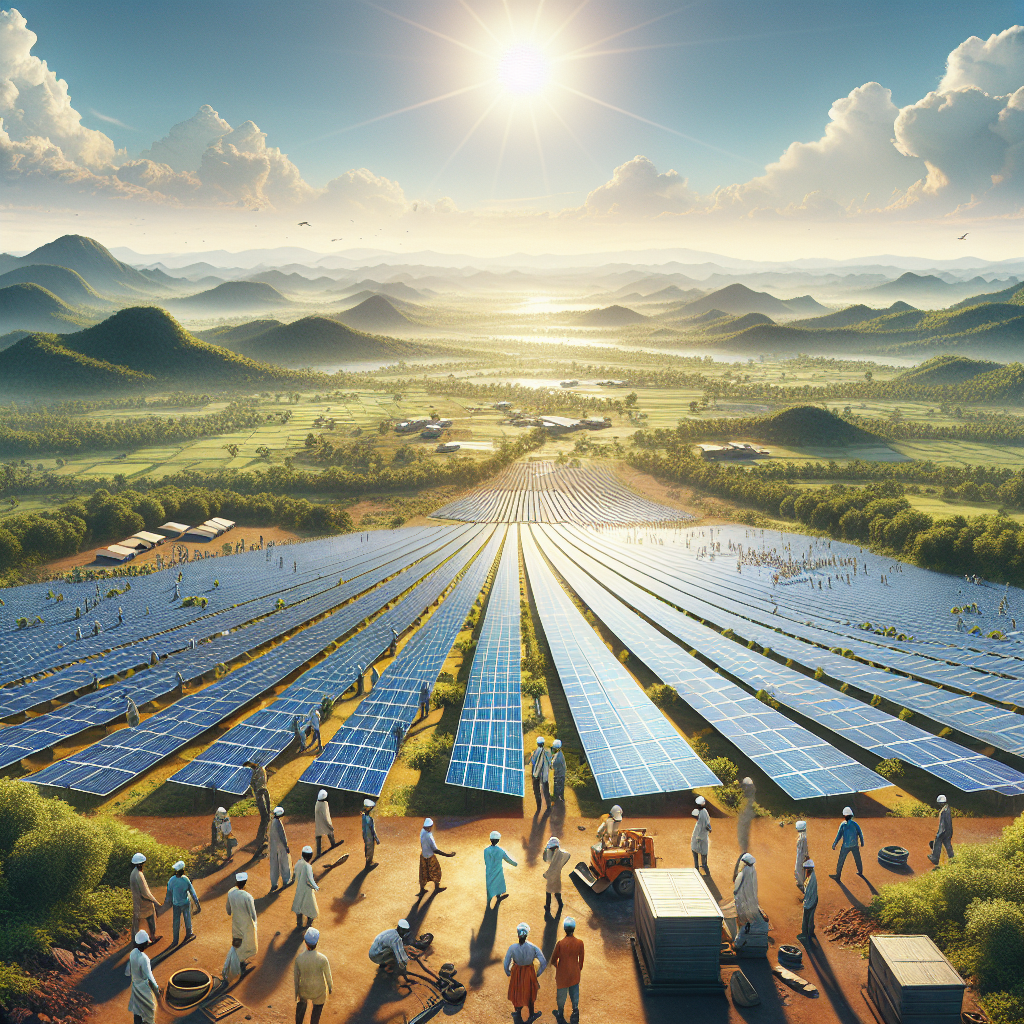President Mahama Launches 1,000MW Solar Park to Power Ghana’s Industrial Future
President John Dramani Mahama broke ground for the project, affirming the government’s commitment to an industrial revolution powered by clean energy.

- Country:
- Ghana
Ghana has taken a monumental step toward a sustainable energy future with the launch of a 1,000-megawatt (MWp) solar park project at Agortor in the Dawa Industrial Enclave, Greater Accra Region. President John Dramani Mahama broke ground for the project, affirming the government's commitment to an industrial revolution powered by clean energy.
A New Dawn for Ghana's Industrial Growth
The Solar for Industries (SFI) Solar Park, being developed by Solar for Industries Limited, a subsidiary of LMI Holdings Limited, represents one of the most ambitious private renewable energy projects in sub-Saharan Africa. The $1.2 billion initiative will be constructed in two phases, beginning with an initial 200 MWp capacity.
The first phase, a 100MWp installation—equivalent to about 2% of Ghana's total power supply—is expected to be completed by December 2026, while the second phase will add another 100MWp within nine months. When fully operational, the solar park will expand to 1,000MWp by 2032, making it the largest privately developed utility-scale solar farm in sub-Saharan Africa (excluding South Africa).
Energy Sovereignty Through Innovation
Speaking at the sod-cutting ceremony, President Mahama described the project as a "symbol of Ghana's clean industrial revolution." He noted that the initiative not only aligns with Ghana's energy transition goals but also demonstrates growing investor confidence in the country.
"This is how development should work—one project generating many opportunities," the President said. "Let us build this project with integrity, speed, and purpose, so that when we return here to commission it, we can all say with pride that this is the dawn of Ghana's clean industrial revolution."
President Mahama outlined Ghana's long-term energy vision anchored on three pillars:
-
Sovereignty – increasing local energy generation using renewable sources like the sun, wind, and water.
-
Sustainability – ensuring environmental protection through clean energy practices.
-
Security of Supply – guaranteeing consistent and reliable access to electricity for industries and households.
He emphasized that Ghana's progress toward industrialization must be accompanied by environmental stewardship.
"As we pursue industrial growth, we must also restore our natural heritage. Our rivers must run clear, our forests must regenerate, and our communities must breathe clean air."
Driving the Green Industrial Revolution
President Mahama praised the Solar for Industries initiative for aligning with national environmental programmes such as Blue Water Guards, the Tree for Life Reforestation Programme, and the Clean Ghana Campaign. These projects together form a holistic approach to economic development—combining green energy, climate resilience, and job creation.
He added that Ghana's reform agenda aims to provide a "win-win environment for both investors and citizens." The SFI project, he said, exemplifies how public-private partnerships can power a modern, sustainable economy.
Investment Partners and Strategic Collaboration
The project is being implemented in collaboration with an impressive consortium of local and international partners, including:
-
International Finance Corporation (IFC) of the World Bank,
-
Enclave Power Company,
-
John Murphy Construction (JMC),
-
China International Water and Electric Corporation (CIWE), and
-
SgurrEnergy, a global renewable energy engineering consultancy.
This partnership reflects Ghana's growing attractiveness as an investment destination for green infrastructure and energy innovation.
Industrial Benefits and Economic Impact
Kojo Aduhene, CEO of Quarm Investments, announced that industries operating within the Dawa Industrial Enclave will benefit directly from the project through a 10% electricity discount once the solar park is operational.
"This project supports the 24-hour economy initiative and aligns with Ghana's industrialisation drive. It also sends a strong message that Ghana is open for business," Aduhene said.
The solar park is expected to create thousands of jobs, particularly for engineers, technicians, and construction workers during the build-out phase, while also stimulating the growth of ancillary industries in manufacturing, logistics, and technology services.
A Beacon for Africa's Energy Transition
When completed, the Agortor Solar Park will serve as a regional model for large-scale renewable power generation. Experts say it could save Ghana millions of dollars in fuel imports annually, reduce carbon emissions by over 800,000 tonnes per year, and strengthen the country's commitment to the Paris Agreement on Climate Change.
Furthermore, the project supports the ECOWAS Renewable Energy Policy, which calls for a 10% renewable energy share in the region's energy mix by 2030. Ghana's leadership in this space reinforces its position as a pioneer of Africa's clean energy revolution.
Lighting the Path to a Sustainable Future
President Mahama concluded the ceremony with a powerful message of hope and vision:
"As we cut the sod, let us remember that every light that shines from this Solar Park will illuminate not just factories and homes, but the aspirations of millions of Ghanaians whose dreams rely on energy and power."
The Agortor Solar Park is more than an energy project—it is a national symbol of innovation, sustainability, and self-reliance, positioning Ghana at the forefront of Africa's transition to a green industrial economy.
ALSO READ
-
IMFA Embraces Renewable Energy in Strategic Shift Toward Sustainability
-
Power Finance Corporation Boosts Profit Amid Renewable Energy Focus
-
Punjab's First Giga-Scale Solar Module Plant: A Major Leap for Renewable Energy
-
Inox Wind Secures 229 MW Orders from Renewable Energy Leaders
-
India’s Renewable Energy Push Enters New Era of Grid Integration and Smart Market Reforms









